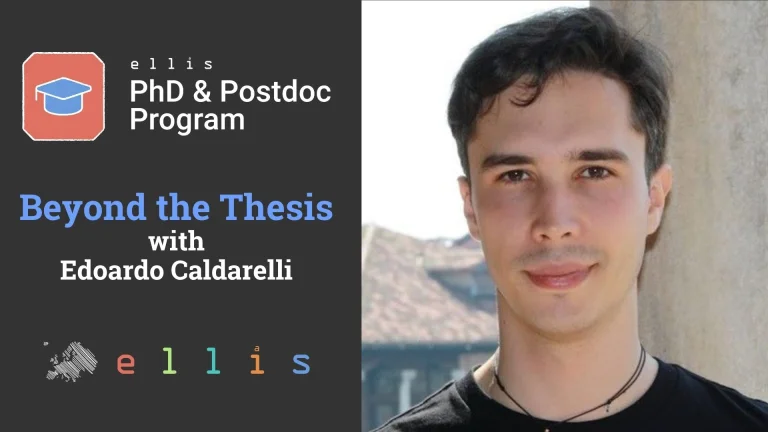



Beyond the Thesis with Edoardo Caldarelli
Name: Edoardo Caldarelli
Affiliation: Istituto Italiano di Tecnologia
Role: Postdoc
Area of research: Data-driven control algorithms
Further info: https://scholar.google.com/citations?user=JVRCLkgAAAAJ&hl=en
PhD Primary Advisor: Carme Torras (ELLIS Fellow), Secondary Advisor: Lorenzo Rosasco (ELLIS Fellow)
ELLIS Experience
Can you briefly describe your PhD research and how the ELLIS network or its resources supported it?
During the PhD, I focused on topics at the intersection of robotic manipulation, machine learning, and automatic control algorithms. This was possible thanks to the collaboration, within the context of the ELLIS PhD program, of research groups with very different expertise, namely the ELLIS Unit Barcelona, which was my main host (specifically, Barcelona’s Robotics Institute and the Polytechnic University) and the ELLIS Unit Genoa (specifically, the Machine Learning Genoa Center). My exchange in Genoa, from which two collaborative research works stemmed, was mainly supported by the ELISE mobility grant. Moreover, I had the opportunity of attending all the ELLIS Doctoral Symposiums since the first edition (in Tübingen) until the 2024 edition. It was great to witness the rapid growth of the ELLIS PhD community, and gradually build a stable network of contacts over the years.
What was the most valuable aspect of being part of the ELLIS community during your PhD?
I would say, the possibility of connecting and working with researchers from very different fields, building a common ground and developing ideas that go beyond classic borders between scientific communities (in my case, for instance, statistical learning and control theory). I believe this is only possible within a community like ELLIS, that works at a higher level than research groups or research institutes.
Besides the positive aspects that I mentioned before, another advantage was the possibility of entering the ELLIS community through a single application, that allowed me to reach out to a few different research groups (that then joined forces in the ELLIS co-supervision). In the same line, I really appreciate that the ELLIS application portal also allows PIs to contact candidates if they are interested in their profiles. These may seem like plain practical advantages, but indeed they have a great impact on the well-being of the perspective PhD student, because: They allow to focus on content rather than on the bureaucratic aspects of the PhD applications, at least when starting off. They allow to “fine tune” the student’s interests and ambitions based on the connections made during the application process and they may foster collaborations that are not obvious (e.g., if the candidate does not know a certain PI, but their research turns out to be of great interest for the candidate themselves).
What's one memorable moment from your ELLIS PhD that you'd like to share?
I would mention here the first joint meeting that I had with my thesis advisors, Carme Torras and Adrià Colomé, and my ELLIS co-host, Lorenzo Rosasco. This was my first contact with the challenge of integrating robotic manipulation of deformable objects, and statistical learning, and it formed the basis of the whole work I did in the subsequent years.
How did the international exposure and collaborations within ELLIS contribute to your professional development and network?
I would say the major contribution of ELLIS to my professional career is that my current position as Postdoc is in the same research group that hosted me for the exchange, while I still maintain an active collaboration with my main host during the PhD. Moreover, technically speaking, during the PhD I was exposed to a whole bunch of new topics (mainly related to statistical learning theory) that I had not focused on previously, but are now a fundamental building block of the research I am doing.
What didn’t go as you expected during your ELLIS PhD? What could be improved in the program?
While the application process for the ELLIS PhD program had all the advantages that I mentioned before, once it was over, I had to face very complex bureaucratic procedures in order to enroll. Also, such procedures differ a lot from country to country. I believe that the ELLIS Society would be the best candidate to foster a standardisation of such procedures within the Bologna area, to facilitate mobility across countries at all levels of the academic path.
Current Role & Career Path
Can you briefly describe your career trajectory since graduating from the ELLIS PhD program?
After graduating in January 2025, I started a postdoc at Istituto Italiano di Tecnologia. I decided to continue working in academia, since I saw the opportunity of developing some ideas of my PhD even more in depth. I have really enjoyed the idea of working at the edge of knowledge, trying to push my understanding of the problems I am dealing with a bit further everyday. More specifically, I find it extremely rewarding when my ideas and the ones of my collaborators are discussed by other experts in the field, and eventually shaped in the form of a contribution to a scientific field. Over the years, I also learned to appreciate the peer reviewing process, which is indeed very tough to go through in the beginning - however, as we say in control theory, feedback is gold! I find constructive discussions with reviewers extremely helpful and instructive, both from a personal and from a scientific point of view.
Impact of Your Work in AI
Do you have any recent or relevant publications you would like highlight?
Even though I have just started my postdoc, I would like to mention here the two journal papers that stemmed from my PhD: Perturbation-based stiffness inference in variable impedance control (IEEE-RAL) was the first paper I worked on in my PhD, and was an excellent opportunity to start familiarizing with robotics (something I had not done before). It placed my research in the rising wave of variable impedance control, a nowadays very popular field that tries to combine robot control with safety requirements coming from non-standard, unstructured application domains (assistive robotics). Linear quadratic control of nonlinear systems with Koopman operator learning and the Nyström method (Automatica) was the last paper I did in my PhD, and was a contribution towards building a theory of (approximate) data-driven control through the lenses of statistical learning theory. This is also an increasingly popular area of research, and this is the work in which I appreciated the most doing interdisciplinary research.
Given that I have just started the postdoc, most of the work is still in progress. However, I hope to have two new projects in advanced stage by the end of the year. These two projects are related to the use of data-driven control methods for complex tasks. One of them is more applicative (it relates to the problem of robotic cloth folding, an open challenge in robotic manipulation nowadays), while the second one is more theoretical, and consists of studying the properties and guarantees of a specific class of data-driven, predictive control algorithms. Overall, I really enjoy working on such different aspects of the same problem, and I hope I can continue doing so in the upcoming years.
How does your research contribute to the development of AI and its broader implications for society?
The aim of my work is to extend and apply practical and theoretical results related to statistical ML (mainly based on kernel methods) to other fields, and specifically the field of automatic control. The impact of this type of research is twofold. On the one hand, it allows to bring cheap, data-driven approximations in the world of automatic control algorithms, that can therefore become more efficient and be applied to increasingly challenging domains (in which, e.g., resource or real-time constraints appear). On the other hand, it poses the challenge of identifying sources of failure, ideally from a quantitative perspective, since such approximated algorithms are often embedded in cyber-physical systems with strict safety requirements.
What are you most passionate about in your current role?
The field of data-driven control is really active nowadays, and I enjoy being part of this wave of research. I also really appreciate how the main features of this field, that I mentioned in my previous answer, are somehow different from the AI mainstream (featuring, e.g., transformer-based models), which often lacks a major focus on efficiency and sound theoretical guarantees.
What are the most exciting or promising areas of AI research that you see on the horizon?
Besides the technical problems I am studying now, I believe the integration of deep learning models and shallow ones (e.g., kernel methods) may provide a twofold benefit, especially when considering, e.g., controlled systems like robots. This combination would allow for general-purpose task reasoning and planning, by means of pre-trained deep models, while supplying reliable and efficient-to-train low-level control algorithms, represented by means of shallow models. As demonstrated, e.g., in the case of image classification and robot vision, this combination yields major savings in terms of computational resources, and allows to better understand the behavior of the controlled systems.
